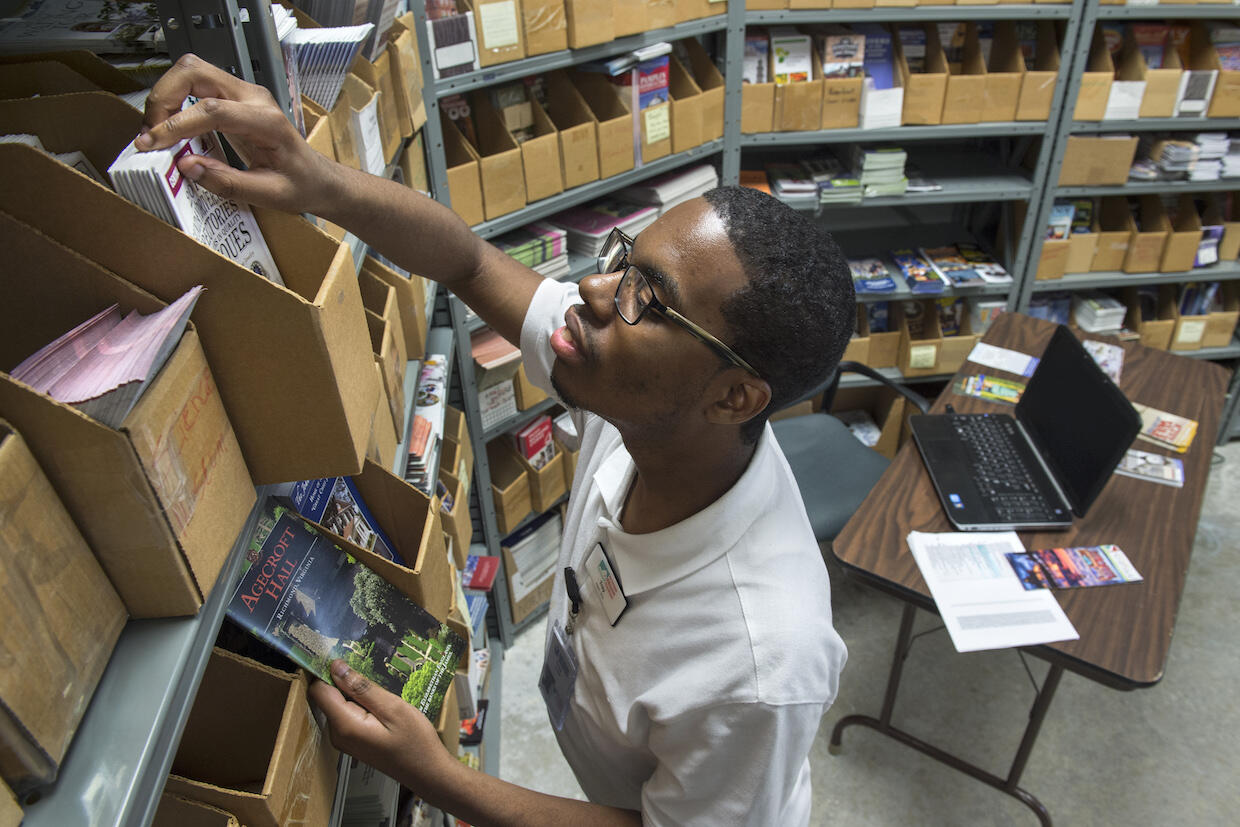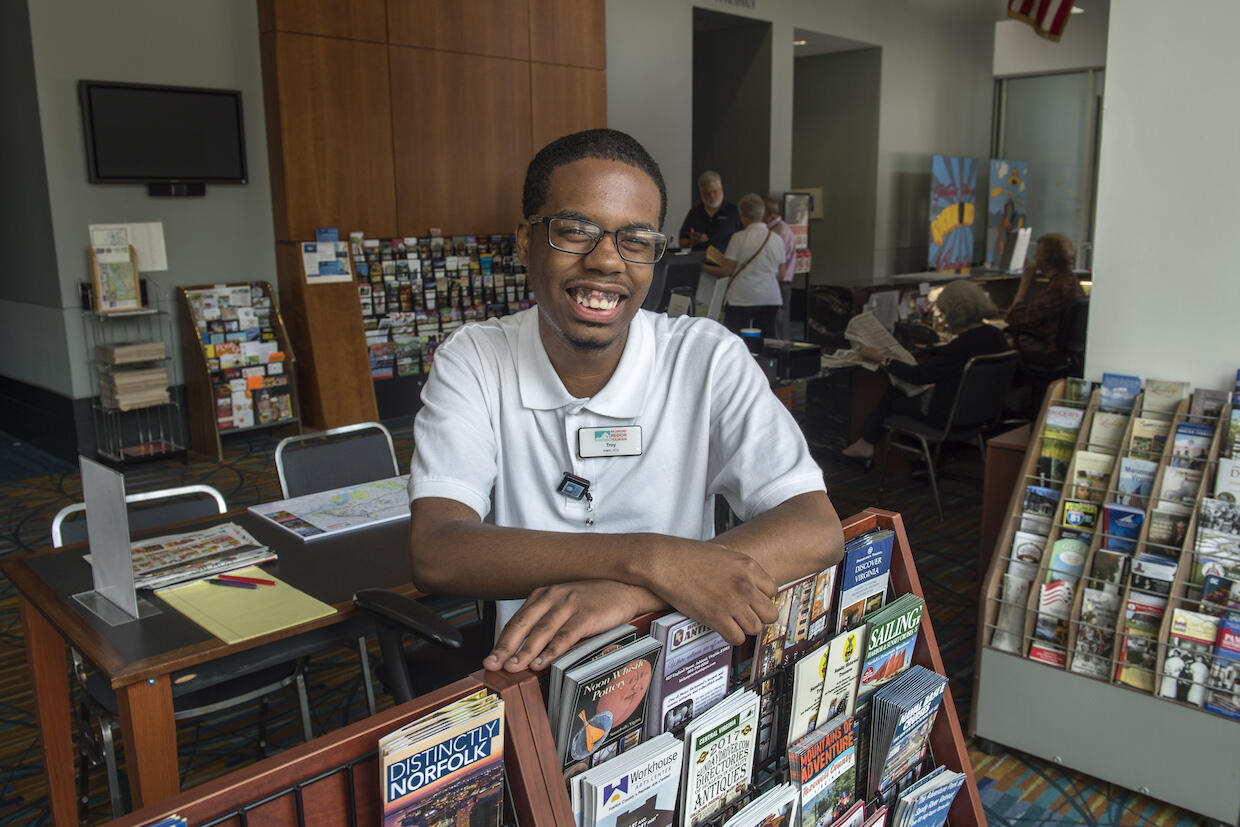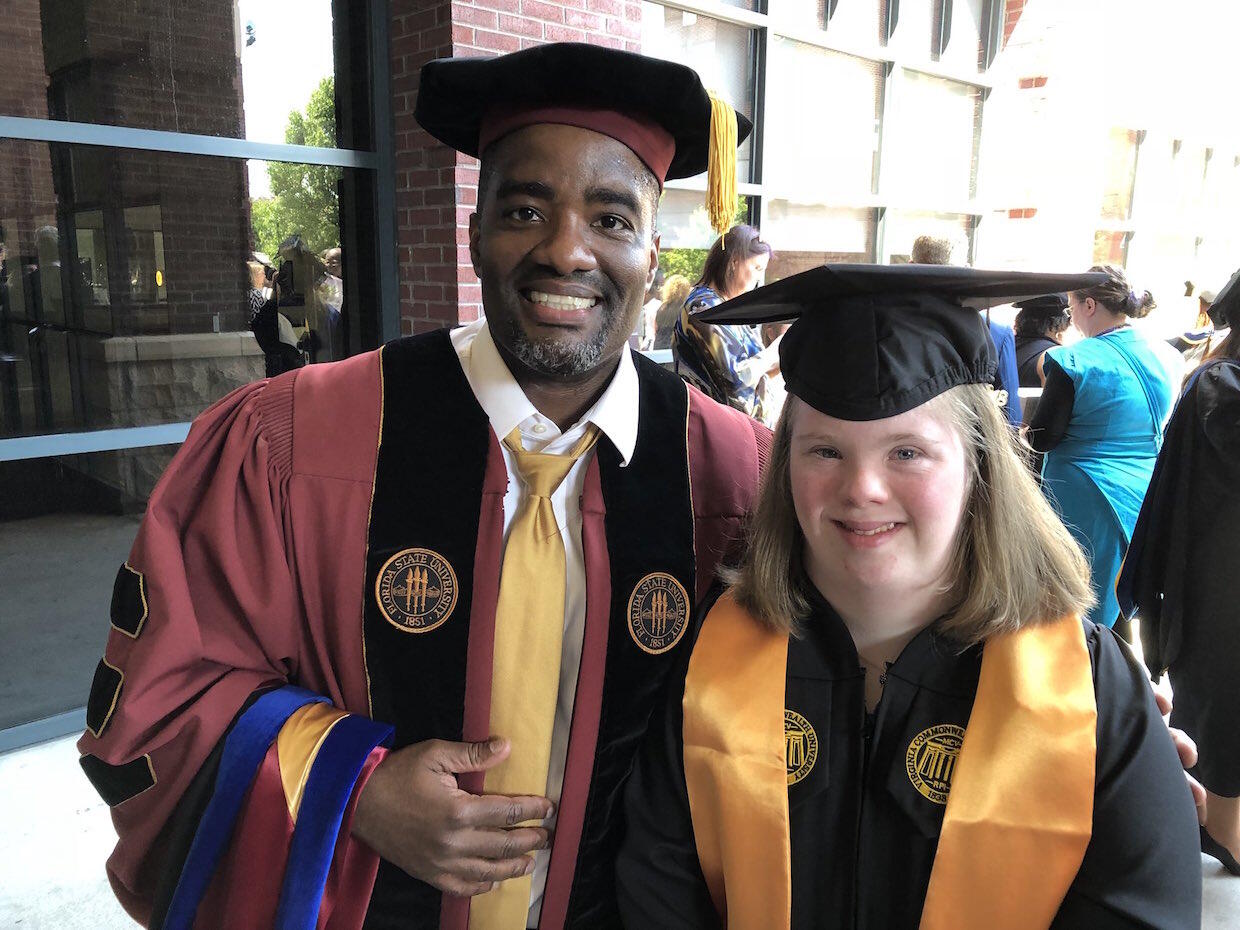
June 21, 2018
After graduating from VCU program, young people with intellectual disabilities find employment and fulfilling, independent lives
Share this story
Troy Carter, a 20-year-old from Henrico County with an intellectual disability, was told in high school that attending college was likely out of the question, and that his future career options would be limited.
But Carter knew he wanted more out of life. He applied to Virginia Commonwealth University’s ACE-IT in College program for students with intellectual disabilities. In ACE-IT, Carter and his classmates took VCU classes, worked on campus in part-time jobs and participated in internships — all with the goal of securing employment in each of their individual areas of interest.
“I always keep my eyes on the prize,” he said.
In the spring, Carter was one of five students to graduate from ACE-IT. Shortly after graduation, he landed a job with Richmond Region Tourism.
“Troy is great and we are connecting very well,” said Michelle G. Lovatt, vice president of administration for Richmond Region Tourism. “He is working for all departments of our organization and will help with all kinds of projects. He made packets … for our I Am Tourism ambassador program and he started an inventory project in our visitor center.”
Including Carter, all five students in this year’s ACE-IT graduating class have landed competitive post-graduation jobs that will allow them to live more independent and fulfilling lives.
“It’s so important to be independent because you can't rely on your family all the time,” Carter said. “It’s sad but true, but your family is not always going to be there for you in life. So you have to learn to do things yourself.”

People with intellectual and developmental disabilities are historically unemployed or underemployed despite their ability, desire and willingness to work, according to the American Association on Intellectual and Developmental Disabilities. A national survey found that only 15 percent of respondents reported that their family member with an intellectual or developmental disability was employed.
Since ACE-IT started at VCU in 2011, 90 percent of its alumni have obtained paid, competitive, inclusive employment. And 86 percent of ACE-IT students and families have reported improved quality of life.
A two-year program for 18- to 26-year-olds with intellectual disabilities, ACE-IT is part of the Center on Transition Innovations, a collaborative effort between the VCU School of Education, the Virginia Department of Education and the Virginia Department for Aging and Rehabilitative Services.
“I think sometimes there’s a misconception about why individuals who are nontraditional would come to college. But that’s what college is all about. It is a pathway for everyone, traditional or nontraditional,” said Elizabeth Evans Getzel, director of the Center on Transition Innovations.
“[Our students] are benefiting from academics and they are benefiting from their employment experiences,” she said. “We tie that all together with their interests and their passions and they go out into the community.”
A key part of ACE-IT is taking classes at VCU as a part-time student. For Carter, he most enjoyed an urban studies course focused on Richmond and its history. That class, he said, turned out to be relevant to his job at Richmond Region Tourism.
“[In my new job, I have been] learning different things about the Richmond metropolitan area and the history of it because I get to go out and experience the activities,” he said. “We had somebody come from Paris who had never been to Richmond, so we showed him the sites and the first building we showed him was the [Institute for Contemporary Art] at VCU.”
I think sometimes there’s a misconception about why individuals who are nontraditional would come to college. But that’s what college is all about. It is a pathway for everyone, traditional or nontraditional.
ACE-IT also provided Carter with experience using technology, such as speech-to-text and text-to-speech devices, that help him with his work.
The program helped him get used to what it’s like working in a job, he said.
“I learned just to be myself and talk to people,” he said. “I learned job skills and how to be independent and do things different, lead a normal life.”
Another important aspect of ACE-IT is that it places students in on-campus jobs and internships at VCU and around Richmond.
For paid campus employment, ACE-IT students have worked at the Cary Street Gym, VCU Libraries, the Child Development Center, Graduate Studies, the Partnership for People with Disabilities, the School of Social Work, Aramark, the School of Education, the Center on Transition Innovations, the Office of Continuing and Professional Education, VCU Police, Facilities Management and the Child Care Center.
Internships, which relate directly to ACE-IT students’ line of work they want to pursue post-graduation, have included the Federal Reserve Bank of Richmond, Altria, Tussing Elementary School, Innsbrook After Hours, the VCU Siegel Center, the Virginia Holocaust Museum, Powell Orthotics and Prosthetics, VCU Clinical Laboratory Sciences, Firehouse Theatre, the Virginia Museum of Fine Arts, the Science Museum of Virginia, and Richmond Animal Care and Control.

ACE-IT’s combination of work experience and academics provides students with the skills they need to translate to employability.
“It’s important for all individuals that want to work to have the opportunity to work,” said Aliza Weiss, career support specialist in the Center on Transition Innovations. “Individuals with intellectual disabilities are no exception to that mandate. Individuals with intellectual disabilities have historically been excluded from higher education and employment opportunities. Long-term employment provides the opportunities for stability in employment, routine, pay and lifestyle.”
Kelly McCown graduated from ACE-IT this spring. McCown wanted to find a job in her area of interest: working with children. This week, she was hired by Westminster Canterbury’s Child Development Center.
“I want to work with children,” she said. “I want to have an apartment with friends. I think ACE-IT helped me learn how to be independent.”
At VCU, McCown took classes in the School of Education and interned at a child care facility.
“I learned a lot in my classes — I took education classes to help me when I look for a job,” she said. “I liked learning how to get around VCU. My internships helped me learn about how to work with children.”
It’s important for all individuals that want to work to have the opportunity to work. Individuals with intellectual disabilities are no exception to that mandate. … Long-term employment provides the opportunities for stability in employment, routine, pay and lifestyle.
For Carter, graduating from ACE-IT and finding a job with Richmond Region Tourism were just the latest in a string of achievements. He has been giving inspirational talks at events about his journey, and was recently recognized with a Black History in the Making Award from the Department of African American Studies in the VCU College of Humanities and Sciences.
In addition, this month he received the 2018 Virginia Division on Career Development and Transition Youth of the Year Award for “exemplifying significant outreach and involvement to achieve his transition goals.”
ACE-IT stands out, Getzel said, because it not only helps young people with intellectual disabilities defy the odds and find jobs, it helps them find career-path jobs in their areas of interest.
“The unemployment or underemployment rate for individuals like Kelly [McCown] and Troy [Carter] are very high, meaning that there's high unemployment and high participation in being underemployed,” she said. “[ACE-IT’s] employment rate — in areas of their interest, in their career area — really is impactful and we want to demonstrate and let people know that this does work, this is important, they are contributing, they are living independently, they're paying taxes, and they're moving through their life as any citizen would.”
Subscribe to VCU News
Subscribe to VCU News at newsletter.vcu.edu and receive a selection of stories, videos, photos, news clips and event listings in your inbox.





